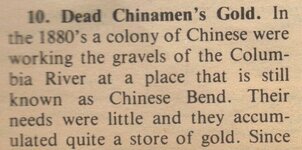Tuberale
Gold Member
I haven't seen anything posted on this, so a word to the wise.
The book "Straw Hats, Sandals and Steel: The Chinese in Washington State", by Lorraine Barker Hildebrand, c. 1977, is a wealth of information on the Chinese experience in Washington. Included are several potential and probable caches.
I think I can quote a paragraph from the book without invoking copyright infringement. The following is from page 16, regarding an extensive Chinese camp near Peach, Washington, which was said to have 400-500 Chinese:
"A small party of Chinese camped across the river and when only two of the Chinese remained a group of whites outfitted themselves with cow's heads, rushed the camp, and when the Chinese fled in fright, they helped themselves to the proceeds of the miners. Another tale is told of the Chinese in Colville, suspected of arson, who was given a trial at a kangaroo court and sentenced to be hanged. While the rabble searched for a rope to accomplish the deed, a sympathetic justice of the peace sized up the situation and allowed the terrified Chinese to escape."
I could find no reference to a Peach, Washington. I did find a Peach Cemetery in Chelan County, Washington, which may be near the same community, but would like to hear more if someone knows.
The book "Straw Hats, Sandals and Steel: The Chinese in Washington State", by Lorraine Barker Hildebrand, c. 1977, is a wealth of information on the Chinese experience in Washington. Included are several potential and probable caches.
I think I can quote a paragraph from the book without invoking copyright infringement. The following is from page 16, regarding an extensive Chinese camp near Peach, Washington, which was said to have 400-500 Chinese:
"A small party of Chinese camped across the river and when only two of the Chinese remained a group of whites outfitted themselves with cow's heads, rushed the camp, and when the Chinese fled in fright, they helped themselves to the proceeds of the miners. Another tale is told of the Chinese in Colville, suspected of arson, who was given a trial at a kangaroo court and sentenced to be hanged. While the rabble searched for a rope to accomplish the deed, a sympathetic justice of the peace sized up the situation and allowed the terrified Chinese to escape."
I could find no reference to a Peach, Washington. I did find a Peach Cemetery in Chelan County, Washington, which may be near the same community, but would like to hear more if someone knows.







